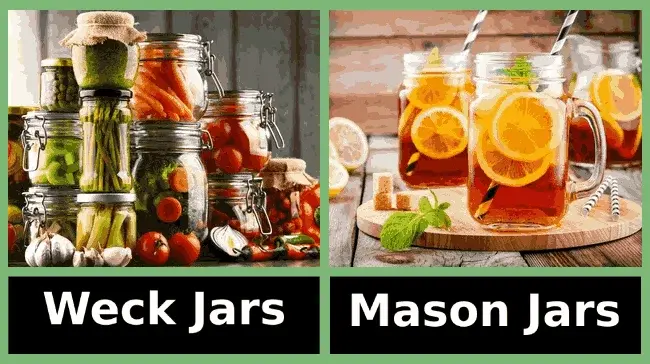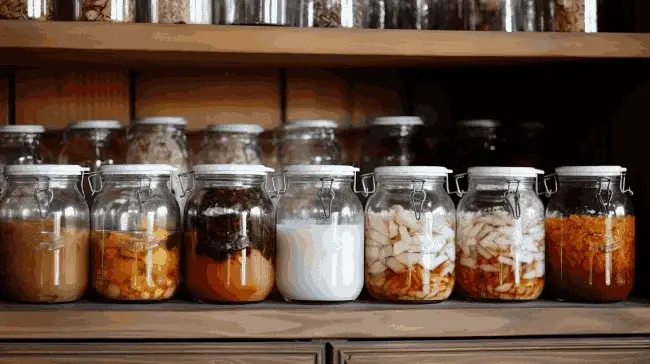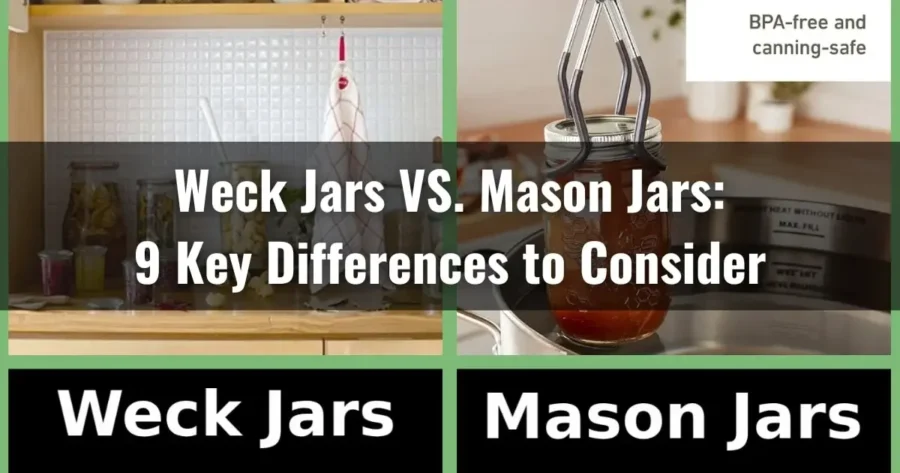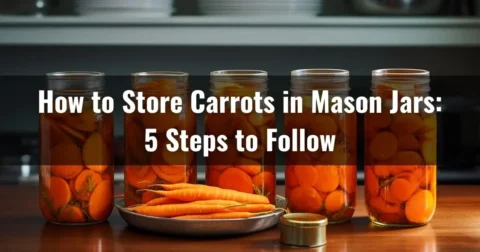The proper storing jar can make all the difference in home canning and food preservation. Yet, when finding the perfect jar, Weck and Mason jars stood out as strong contenders. Both are iconic in their own right, but they compare significantly.
The lid type and design differ, with Weck jars featuring a glass lid and rubber gasket, while Mason jars have a metal lid with a screw-on band. In addition, the materials and fragility of the jars differ, as Weck jars are made of thinner glass and are more fragile, while Mason jars are made of thicker glass.
Throughout this article, we will explore the primary differences between these two popular jars for your kitchen and the problems you may encounter with each. So keep reading to find the perfect bulk food storage for your kitchen.
Jump to Section
Primary Differences Between Weck Jars and Mason Jars for Bulk Food Storage

The primary comparisons between weck and mason jars are worth considering in bulk food storage. These distinct are:
1. Origin and Brand
Weck jars are made by the Weck Company, a German company that has been producing these jars since 1900. They’re known for their high-quality glass and unique rubber seal system, which ensures an airtight and leak-proof seal.
Conversely, Mason jars are primarily associated with North America and are made by various brands, including Ball and Kerr. These jars have a long history in the United States and are known for their durability and versatility.
2. Lid Type & Design
Weck jars have glass lids with rubber gaskets and metal clips, which create an airtight seal when properly closed. The rubber gasket and metal clips are crucial in maintaining the seal. To open, you simply release the clips and lift the glass lid.
Meanwhile, Mason jars have metal screw-on lids with a two-piece design. The flat metal disc has a built-in sealing compound that creates an airtight seal when heated during the canning process. To open, you unscrew the metal band and pry off the flat disc.
3. Lid Reusability
For bulk food storage in your kitchen, you can reuse the lids of Weck jars by getting new rubber gaskets and metal clips. This means that even after multiple uses, you can seal your Weck jars effectively.
However, with Mason jars, you can reuse the lids only if the sealing compound remains intact. If the compound starts to deteriorate or become damaged, you must replace the lids to maintain a proper seal.
The advantage of Weck jars is that you can easily obtain replacement gaskets and metal clips, ensuring you can reuse the lids for a long time.
4. Jar Shape and Opening
Weck jars have a distinctive shape with a tapered body and a wide mouth, making them perfect for storing various foods like fruits, vegetables, and pickles. The wider mouth allows for easy access and filling of the jar.
On the other hand, Mason jars come in different shapes and sizes, including regular-mouth and wide-mouth options. They have a more cylindrical design, making them versatile for canning, preserving, and storing foods like jams, jellies, and pickles.
5. Jars Materials and Fragility
Mason jars have thinner glass walls, making them less durable and more likely to break. They can withstand typical canning and storage conditions more robustly. However, plastic variants of Mason jars are also available, designed for non-canning purposes, and offer even greater durability.
Alternatively, Weck jars are made of thicker glass, which makes them less fragile and prone to less breakage. However, their delicate nature requires careful handling to prevent accidents.
6. Stackability
Weck jars have a straight-sided design that allows for efficient stacking and storage. This means you can easily stack multiple jars above each other in your kitchen without worrying about them toppling over. Straight sides make arranging the jars in your pantry or shelves easier since they fit snugly together.
On the other hand, Mason jars have a tapered design, which can make them less stackable compared to Weck jars. The tapering shape makes it more difficult to stack multiple jars securely, as they’re more likely to wobble and fall over.
7. Storage Time
Weck jars are known for their airtight seal, which helps preserve the freshness and quality of your bulk food items for longer. The glass lids and rubber seals of Weck jars create a tight seal that prevents air from entering, making them perfect for long-term storage.
Mason jars, on the other hand, are more versatile and can be used for canning, storing dry goods, serving beverages, and even as decorative elements. However, they may not provide the same level of airtightness as Weck jars, making them less suitable for long-term bulk food storage.
8. Cleaning
Weck jars are generally easier to clean because they’ve fewer components. With only a glass lid and a rubber gasket, there are no metal bands or flat metal lids to worry about. The glass lids of Weck jars are also dishwasher safe, making cleaning a breeze.
However, Mason jars require more thorough cleaning due to their multiple components. The metal bands and flat metal lids must be carefully washed and dried to prevent rusting. Also, the rubber gaskets of Mason jars should be inspected and replaced periodically to ensure a tight seal.
9. Price Range
When considering the price, Weck jars are more expensive due to their premium glass and unique lid design. These jars are known for their durability and aesthetic appeal, making them popular among those who value functionality and style.
Then again, Mason jars are generally more affordable and budget-friendly. While they may not have the same level of elegance as Weck jars, Mason jars are still reliable and effective for preserving and storing your food.
FAQ’s: Weck Jars vs Mason Jars
Are Weck jars safe for pressure canning in the kitchen?
Weck jars aren’t recommended for pressure canning due to their design. Weck jars have a glass lid, rubber gasket, and metal clamps, unlike Mason jars. These components aren’t designed to withstand the high pressure during pressure canning.

Also, the rubber gasket may not properly seal under pressure, leading to potential food spoilage or even jar breakage. Therefore, it’s best to use Weck jars for water-bath canning only in your kitchen or opt for jars specifically designed for pressure canning when preserving foods using this method.
How long mason jars will stay?
Mason jars typically have a lifespan of 10 to 13 years but may experience increased breakage due to normal wear and tear over time. These jars are designed for canning and preserving food and undergo stress each time they’re used and exposed to heat.
This stress can lead to hairpin cracks that weaken the glass, making it more prone to breaking. While mason jars are durable and reliable, inspect them regularly for any signs of damage or weakening.
Conclusion
Weck and Mason jars have unique characteristics and advantages regarding bulk food storage in the kitchen. However, choosing between these types of jars ultimately depends on your specific requirements and priorities.
Weck jars offer an aesthetically pleasing and reusable option but come at a higher cost. But Mason jars are known for their versatility, suitable for canning, preserving, and storing various foods.
In the end, you have to balance factors like cost, durability, and design to find the perfect match for your specific needs. Consider the key differences discussed above when choosing a jar for home canning or food storage.





